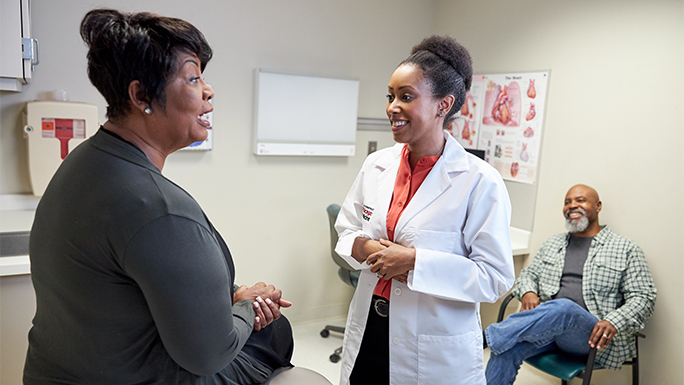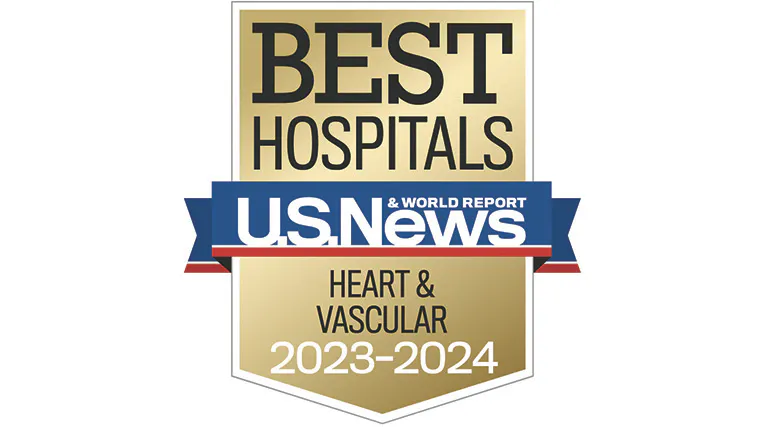UChicago Medicine Vein Clinic

The University of Chicago Medicine vein experts offer the full spectrum of advanced options to treat venous conditions, including varicose veins, spider veins, chronic venous insufficiency, deep vein thrombosis, venous ulcers and more. Our vein experts, all board-certified vascular surgeons, are nationally known for their expertise and have the skills to treat even the most complex vein problems.
Whether you require care to relieve leg pain or you are seeking treatment for aesthetic reasons, UChicago Medicine's Vein Clinic provides the most advanced, comprehensive care. We emphasize minimally invasive solutions and can treat most vein problems on an outpatient basis.
Varicose Veins
What causes varicose veins?
Varicose veins occur when veins fail to properly circulate blood up and back to the heart. As a result, blood pools in the veins, leading to an enlarged, twisted vein appearance. In severe cases, varicose veins can rupture and form ulcers. Varicose veins are most commonly found on the thigh or calf.
Varicose Vein Treatment
Leg pain and fatigue from varicose veins does not have to be chronic, debilitating or unsightly. Our vascular specialists offer a range of treatments for varicose veins, including ambulatory phlebectomy and injection sclerotherapy. After a thorough examination, our experts discuss your options with you to select the best approach. Read more about varicose vein in this Q&A with Dr. Dorsey.
Spider Veins
What causes spider veins?
Spider veins, a milder type of varicose vein, are small blood vessels that look like a spider web or sunburst pattern under the skin. Spider veins are causes by damage to the vein that weakens them. This is what leads the veins on the legs or face to appear red, purple or blue in color.
Spider Vein Treatment
Typical treatment for spider veins is injection sclerotherapy, which involves injection of a solution that causes the vein to collapse. The vein is absorbed into the body and blood reroutes to other veins, removing the spider veins.
Chronic Venous Insufficiency
Chronic Venous Insufficiency Symptoms
Chronic venous insufficiency occurs when valves in leg veins don't function adequately, allowing blood to flow in both directions, not just toward the heart. As a result, blood can pool in the legs, leading to the development of varicose veins, pain, swelling and venous ulcers if left untreated. Chronic venous insufficiency is one of the most common conditions in the United States, affecting 50% of people age 50 and older. It affects up to 55% of women and 45% of men. Besides being cosmetically unattractive, varicose veins can cause chronic leg pain and debilitating fatigue. The affected veins can also develop blood clots.
Chronic Venous Insufficiency Treatment
Treatment for chronic venous insufficiency depends upon the severity of the case. Some people find relief by wearing pressure stockings and/or by taking medications that reduce swelling and improve blood flow. More complex cases may require sclerotherapy (injection of a fluid that closes the vein), radiofrequency vein ablation procedure or surgery for chronic venous insufficiency. If surgery is required, most patients can go home the same day of the procedure.
Deep Vein Thrombosis (DVT)
Deep Vein Thrombosis Symptoms
A deep vein thrombosis is a blood clot that forms in a vein deep in the body, typically within groups of muscles. Often, inflammation can occur at the site of the clot, causing redness, swelling, warmth and tenderness. Deep vein thrombosis can cause serious problems, especially if the clot breaks off and spreads to the lungs causing a pulmonary embolism.
Deep Vein Thrombosis Treatment
Treatments include medications to keep the clot from growing and newer therapies for acute DVT (within two weeks of onset), such as the use of special catheters to inject drugs to dissolve the clot (mechanical pharmacolysis or thrombolysis). Learn more about deep vein thrombosis (DVT).
Venous Ulcer (Leg Wounds)
Venous Ulcer Treatment
Venous ulcers are leg wounds that can be superficial (top layers of the skin) or deep in nature. Venous ulcers are caused by chronic venous insufficiency (venous reflux disease) that occurs due to damaged vein valves that allow blood to pool in the legs. People who have venous ulcers may or may not have varicose veins. Depending upon the patient's anatomy and the severity of the wound, venous ulcers may be treated with compression stockings, local wound care and/or ablation procedures.
Advanced Vein Diagnostics
Our vein clinic uses noninvasive, painless diagnostic techniques to assess vein conditions. We use the latest ultrasound equipment, including color flow duplex ultrasound, which shows vein structure and the speed and direction of blood flow. Our vascular lab meets the highest standards and is accredited by the Intersocietal Commission for the Accreditation of Vascular Laboratories (ICAVL).
Vein Treatment Options
VNUS Closure (vein ablation) is an outpatient procedure for treating leg pain due to varicose veins and their underlying cause, venous reflux (chronic venous insufficiency). Compared to traditional vein surgery, people who have VNUS Closure report many benefits, including:
- Little to no pain
- Minimal bruising
- Quicker return to normal activities (typically within one day)
In a VNUS Closure procedure, the physician will insert a tiny catheter into the refluxing vein. The special catheter is used to deliver radiofrequency energy inside the vein, heating the vein wall to cause the enlarged vein to shrink and close. Blood will reroute to other healthy veins.
This minimally invasive treatment is an outpatient procedure performed using imaging guidance. After applying local anesthetic to the vein, the interventionalist inserts a thin catheter into the vein. A laser is then applied to the inside of the vein, heating and then sealing the vein closed. Once the diseased vein is closed, other healthy veins take over to carry blood from the leg, re-establishing normal flow.
Similar to the VNUS Closure technique, laser vein ablation is a quick, effective procedure that involves minimal discomfort and represents a vast improvement over the traditional option of vein stripping and ligation surgery that was often painful and required up to six weeks of recovery. After the procedure, a patient can literally walk out of the office and resume normal activities within 24 hours. Laser vein ablation boasts a 95-percent success rate.
Ambulatory phlebectomy is a minimally invasive surgical technique used to remove varicose veins. The abnormal vein is removed through a tiny slit-like incision. The procedure can be done under local anesthesia and typically takes less than an hour to perform. Recovery is rapid, and most patients do not need to interrupt regular activity after ambulatory phlebectomy.
Sclerotherapy is a nonsurgical procedure that can be used to treat some varicose veins and nearly all spider veins. The procedure involves injecting a solution directly into the vein, resulting in a reaction that progressively shrinks the varicose vein. If the vein is labeled as "diseased," it may necessitate several treatments to fully fade away.
Many of the procedures offered are performed using ultrasound-guided techniques or with the assistance of fiber optic transillumination technology (Veinlite — a specially designed device that uses light to show veins with high clarity). These approaches allow our physicians to visualize vein structures in great detail before, during and after treatment.
Deep Venous Insufficiency VenoValve System Clinical Trial
The purpose of this study assess the safety and effectiveness of the VenoValve System for the treatment of patients with deep venous valvular insufficiency and the associated complications.
Learn more about this clinical trial.Nationally Ranked in Cardiology, Heart Surgery and Vascular Surgery

Meet Our Vein Clinic Team
Find a Vein Clinic Location Near You
Request an Appointment
To speak to someone directly, please call 773-702-6261. If you have symptoms of an urgent nature, please call your doctor or go to the emergency room immediately.
* Indicates required field

